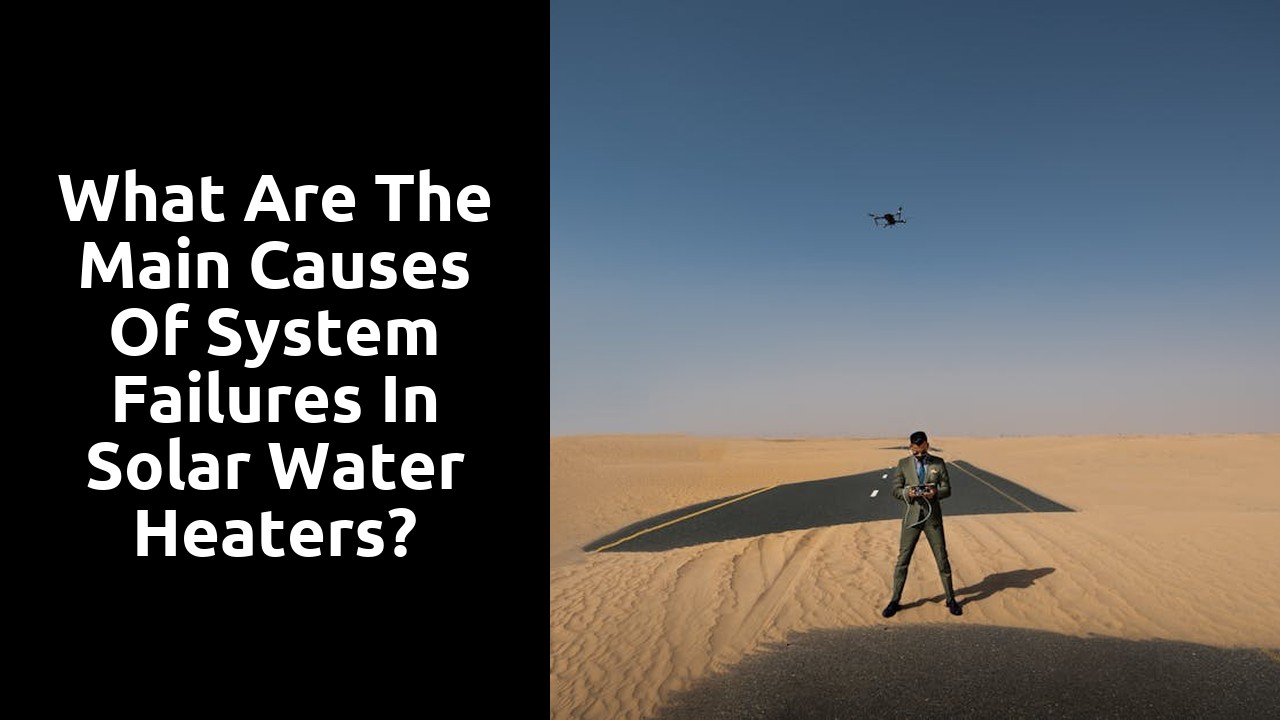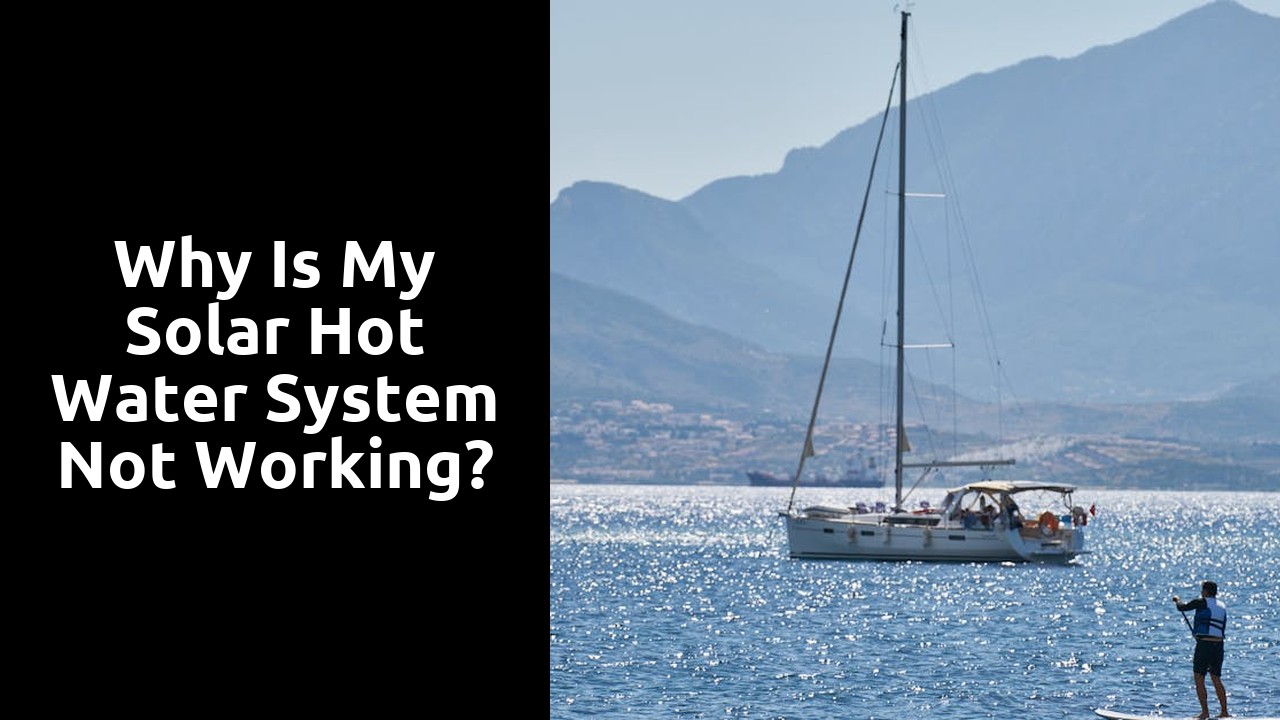
Identifying and Addressing Insulation Problems in Solar Water Heating Systems
Solar Hot Water System Troubleshooting can often point to insulation problems as one of the main causes of system failures in solar water heaters. Recognising signs such as inconsistent water temperatures, especially during colder months, can signal issues with the insulation surrounding the water tank or piping. Inadequate insulation can lead to heat loss, reducing the efficiency of the system and putting strain on the components, ultimately causing breakdowns and malfunctions.
To address insulation problems in solar water heating systems, it is crucial to conduct a thorough inspection of the insulation material and check for any gaps, tears, or signs of deterioration. Adding additional insulation where necessary can help improve heat retention and overall system performance. By properly maintaining and upgrading the insulation in solar water heaters, users can mitigate the risk of system failures and ensure that their system operates efficiently and effectively, providing reliable hot water supply throughout the year.
Methods for Improving Heat Retention and Insulation
Improving heat retention and insulation is crucial for enhancing the efficiency and longevity of solar water heating systems. Adequate insulation helps to minimize heat loss, particularly during colder months, ensuring that the system can consistently provide hot water. One effective method for boosting insulation is to utilise high-quality materials such as foam insulation around pipes and tanks, which can significantly reduce heat transfer and enhance overall system performance. Regularly assessing and reinforcing insulation can prevent unnecessary energy wastage and maintain optimal operating conditions for the system. Solar Hot Water System Troubleshooting is essential in identifying and rectifying any insulation issues promptly to prevent system failures and ensure continued functionality.
In addition to upgrading insulation, homeowners can also improve heat retention by considering the positioning of the solar water heating system. Placing the system in an area with maximum exposure to sunlight and minimal shading can enhance heat absorption and retention, ultimately increasing the system's efficiency. Implementing passive solar heating techniques, such as orienting the collectors towards the sun and reducing obstructions, can further enhance heat retention and ensure optimal performance of the system. Regularly monitoring and adjusting the system's positioning to maximise solar gain can contribute to its overall effectiveness and longevity, reducing the likelihood of system failures in the long run.
The Role of Overheating in Solar Water Heater Breakdowns
Overheating is a common issue that can lead to breakdowns in solar water heating systems. When the system is exposed to excessive heat levels, components such as the collector tubes and storage tanks can be damaged. This can result in decreased efficiency and potential system failures. Solar hot water system troubleshooting often involves addressing overheating problems to prevent further damage and ensure the system operates effectively. Implementing temperature regulation strategies is essential in controlling overheating and maintaining the system's performance.
Proper installation and regular maintenance are crucial in preventing overheating in solar water heaters. Ensuring that the system is correctly sized and that all components are functioning optimally can help avoid overheating issues. If overheating does occur, troubleshooting methods such as adjusting the angle of the collectors, installing shading devices, or incorporating heat dissipation techniques can be effective in managing temperature levels within the system. By being proactive in monitoring and addressing overheating concerns, homeowners can prolong the lifespan of their solar water heating systems and maximise energy savings.
Implementing Temperature Regulation Strategies
Temperature regulation is a critical aspect of maintaining the optimal functioning of solar water heating systems. When temperatures fluctuate excessively, it can lead to system failures and inefficiencies. To address this issue, implementing temperature regulation strategies is essential. By integrating temperature sensors and controllers into the system, users can monitor and adjust the temperature settings accordingly. This proactive approach helps in preventing overheating or inadequate heating of water, thus enhancing the overall performance and longevity of the solar hot water system.
Moreover, regular maintenance checks should be conducted to ensure that the temperature regulation components are functioning correctly. Periodic calibration of sensors and controllers is vital to guarantee accurate temperature readings and precise adjustments. Any deviations from the desired temperature range should be promptly investigated and rectified to prevent potential system breakdowns. By proactively monitoring and maintaining temperature regulation mechanisms, users can mitigate the risk of system failures and optimise the efficiency of their solar hot water system. Solar Hot Water System Troubleshooting.
Understanding the Role of Pump Failures in Solar Water Heating Systems
When it comes to the reliability of solar water heating systems, understanding the common causes of pump failures is crucial. Pump malfunctions can significantly impact the efficiency of the system, leading to decreased performance and potential breakdowns. In the context of Solar Hot Water System Troubleshooting, pump failures often occur due to issues such as airlocks, blockages, or mechanical failures. These problems can disrupt the flow of the heat transfer fluid, hindering the system's ability to effectively capture and transfer solar energy into usable heat for domestic water heating.
To mitigate the risks associated with pump failures in solar water heating systems, regular maintenance and monitoring are essential. By implementing proactive measures such as checking for airlocks, cleaning filters, and inspecting pump components for signs of wear and tear, system owners can minimise the likelihood of pump failures. Additionally, having a clear understanding of the pump specifications and performance requirements can aid in troubleshooting pump issues effectively and ensuring the continuous operation of the solar water heating system.
Troubleshooting Pump Malfunctions and Replacements
Solar Hot Water System Troubleshooting is essential for maintaining the efficiency of solar water heaters. When dealing with pump malfunctions, it is crucial to first check the power supply to ensure the pump is receiving adequate electricity. A common issue that arises is a pump that fails to operate due to a disrupted power connection. Therefore, examining the electrical components and connections should be the initial step in troubleshooting pump problems.
If the power supply to the pump is confirmed to be functioning correctly, the next potential cause to investigate is any potential airlock present in the system. Airlocks can hinder the pump's ability to circulate water effectively, leading to reduced performance or complete pump failure. To address this issue, bleeding the air from the system can often resolve the problem and restore optimal pump operation. Regular maintenance checks that include inspecting for airlocks can help prevent future pump malfunctions in solar water heating systems.
FAQS
What are the main causes of system failures in solar water heaters?
The main causes of system failures in solar water heaters typically include insulation problems, overheating issues, and pump failures.
How can insulation problems impact the performance of solar water heating systems?
Insulation problems in solar water heaters can lead to heat loss, reduced efficiency, and increased energy consumption.
What strategies can be used to improve heat retention and insulation in solar water heating systems?
Methods for improving heat retention and insulation in solar water heating systems may include adding additional insulation, repairing damaged insulation, and ensuring proper installation techniques are followed.
What role does overheating play in the breakdown of solar water heaters?
Overheating in solar water heaters can cause damage to components, reduce the lifespan of the system, and lead to system failures if not addressed properly.
How can pump failures impact the performance of solar water heating systems?
Pump failures in solar water heating systems can result in reduced water circulation, decreased heat transfer, and ultimately system breakdown if not rectified in a timely manner.
